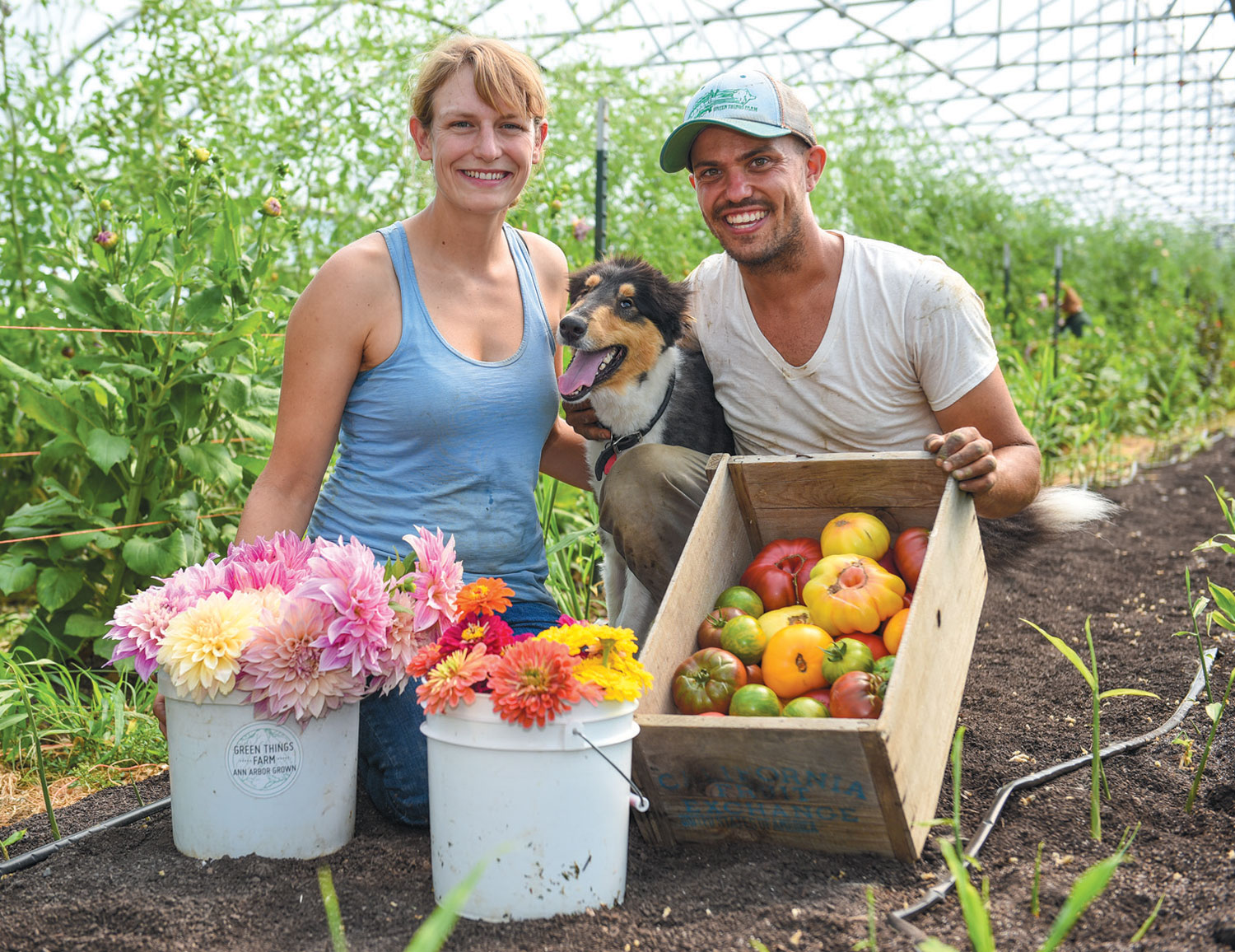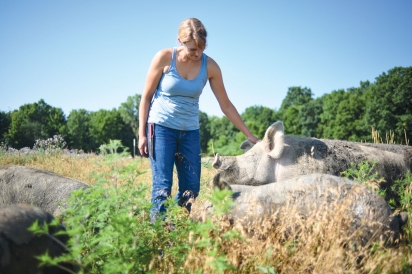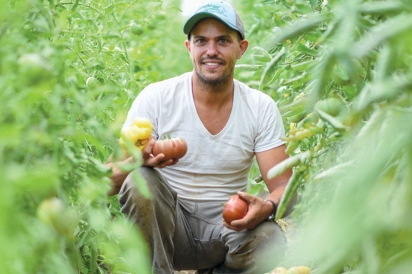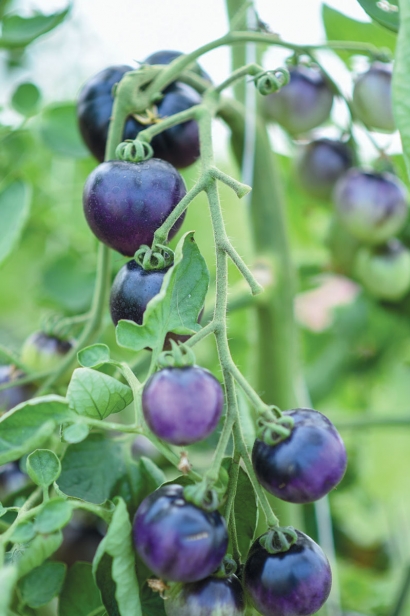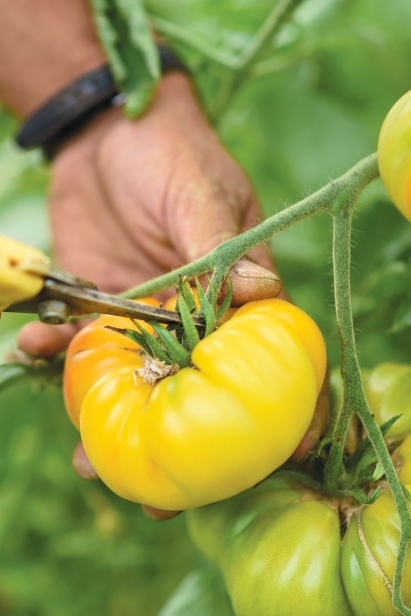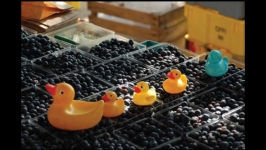Green Things Farm Unpaves the Way for Farming in Ann Arbor
Drive north on Nixon Road out of the University of Michigan’s North Campus and the landscape quickly begins to change. Massive institutional research facilities soon give way to newer subdivisions sprouting up everywhere alongside the two-lane road. Then suddenly, on your left, the landscape opens up, and a high-tunnel greenhouse and farm stand come into view.
This is Green Things Farm, and it’s one of the success stories of Ann Arbor’s Greenbelt Program. The program was approved by voters in 2003 to preserve “open space, natural habitats and working landscapes both inside and outside the city limit.” It’s funded through a City of Ann Arbor millage that leverages grants and donations to purchase development rights and place conservation easements on land surrounding the city. So far, 4,300 acres have been preserved.
One of the preserved properties is Green Things Farm, where Jill Lada is busy pruning plants in the high tunnel. It’s a hot day, and Lada—dressed in a tank top, jeans and boots—stops to wipe the sweat off her brow. The work is hard, but Lada counts herself as fortunate. “I love working outside with my hands and doing something that feels meaningful and benefits local community and landscape,” she says.
Lada grew up riding horses in suburban Grand Rapids, so she knew she loved the land. But she planned to act on that passion through working to restore native landscapes. She studied restoration ecology at the University of Michigan’s School of Natural Resources and planned to work with government, nonprofits and communities to restore damaged ecosystems and preserve native species.
Her plans changed in her last year of college when she met Nate Lada. The two fell in love and began talking about starting a farm together. They began looking for land in southwest Michigan with little success. Then, in 2010, they heard about a new program starting in Ann Arbor: the Tilian Farm Development Center. The program is designed to help beginning farmers learn the skills and make the connections needed to start their own farms.
“We sent in the application, and three weeks later we were farming,” Lada recalls. The pair began working in Tilian’s two-year farmer residency program, operating on another piece of land secured through the Ann Arbor Greenbelt Program on Pontiac Trail. Tilian has given rise to numerous successful independent farming ventures since it began, including Seeley Farm and Honest Eats.
Halfway through their second season at Tilian, the property on Nixon road came up for sale. “The developers who owned it wanted to place a conservation easement on it,” Lada says. With help from a USDA grant to fund purchase of the easement, the development rights were sold to Ann Arbor Township through the Greenbelt Program. “That made it possible for us to purchase the land at agricultural value instead of development value.”
But even with the conservation easement in place, the land was expensive, and the pair found that lenders were unwilling to take a chance on them. So they turned to Nate Lada’s parents for a loan to buy the land. “As young people straight out of college, we had no credit. I don’t know how else we’d have been able to do it,” says Jill Lada. “We are very lucky to have family that support us.”
The land was in soybean production when they took ownership in 2011. Nate and Jill got married and started farming in 2012. In the last four years, they’ve constructed three hoop houses, a well and a barn. The land includes 64 acres, 44 of which are tillable and 20 of which are forested. Lada is keen to preserve and restore the forested land while developing the farm.
In addition to the hoop houses, three acres are currently in vegetable production and the remaining land is in cover crops, grains and pasture. The Ladas currently raise heritage-breed Berkshire pigs, heritage chickens and cattle, all raised for meat and processed at an organic processing facility near Lansing. They also maintain horses for riding.
One of the biggest challenges, says Lada, is the soil quality on the farm. “We bought the land because of the amazing location just at the border of Ann Arbor,” she says. “But the soil needs a lot of work.” In an effort to amend the soil, the Ladas are taking a “lean year” on vegetable production and are employing rotational covercropping and rotational grazing to add humus and nutrients to the soil. They are also experimenting with growing their own animal feed and raising their own cover crops.
Green Things Farm attained USDA Organic Certification in 2015 and is striving to improve its methods and incorporate permaculture techniques into its operations. This summer, they are focusing on hoop-house-raised tomatoes, peppers and melons, as well as herbs, raspberries and their signature specialty carrots.
Green Things Farm produce can be found at the Ann Arbor Farmers’ Market on Saturdays, and at the Argus Farm Stop. They also sell to area farm-to-table restaurants, with the bulk of their produce this year appearing on the menu of Spencer, a restaurant and cheese bar that opened on Liberty in 2015. A fall CSA subscription is also available.
The market is competitive, says Lada, but the robust demand for local produce in Ann Arbor has meant that Green Things Farm has remained in the black since opening. Being part of a community of local food producers, chefs and consumers has made it all worthwhile for Lada.
“There’s a really vibrant community here of young farmers and old farmers,” she says. “Farming is physically and emotionally exhausting, and not financially lucrative. But I get to do a lot of things I’m passionate about: working with animals and engaging with the community.”
Find out more at Green Things Farm


